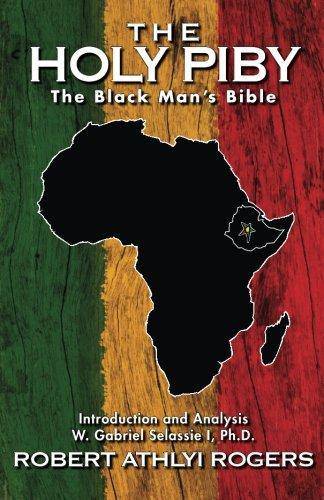Description
The Holy Piby is an early 20th-century prophetic vision and theological treatise intended to unite Diasporic Blacks in a holy union of prosperity and hope. Written by Robert Athlyi Rogers in 1924 The Holy Piby is the first of three foundational religious texts adopted by the Rastafarian faithful. This edition by scholar and theologian W. Gabriel Selassie I, is the first and only comprehensive book that provides a full analysis of the mission and sermon of Robert Athlyi Rogers and his Afro-Athlican Constructive Gaathly.
Author: Robert Athlyi Rogers
Publisher: W. Gabriel Selassie
Published: March 24, 2015
Pages: 150
Binding Type: Paperback
Weight: 6.4 ounces
Size: 5.5 x 0.34 x 8.5 inches
ISBN13: 9780986381904
ISBN10: 098638190X
BISAC Categories:
- Tribal & Ethnic Religious Practices
- African American Demographic Studies
Introduction:
The Holy Piby is a religious text that has become a significant part of the Rastafari movement. It is also known as The Black Man's Bible, as it focuses on the role of black people in the Bible and their connection to Ethiopia. The text was first published in 1924 by Robert Athlyi Rogers, a Jamaican religious leader who founded the Afro-Athlican Constructive Gaathly Church in the early 20th century.
History and Origin of the Holy Piby:
The church preached self reliance origins of the Holy Piby can be traced back to the early 1900s in Jamaica. Robert Athlyi Rogers, who was born in Anguilla in 1883, claimed to have received divine revelations that led him to found his own religious movement. He believed that black people were the chosen people of God and that Ethiopia was the promised land. Rogers spent years writing and compiling the Holy Piby, which he claimed was based on ancient Ethiopian texts.
Teachings and Beliefs of the Holy Piby:
The afro athlican constructive church Holy Piby contains a mix of Old Testament stories and apocryphal texts, along with Rogers' own interpretations and teachings. The worthy prophecies text emphasizes the importance of Ethiopia and its role in the Bible, and it argues that black people are the true descendants of Israel. It also promotes the idea of racial separatism, urging black people to unite and form their own separate society.
In addition, the saving souls Holy Piby includes a code of moral conduct that emphasizes the importance of self-discipline and righteousness. It also contains instructions for rituals and ceremonies, including the use of marijuana as a sacrament.
Impact and Influence of the Holy Piby:
The afro athlican constructive church Holy Spirit had a significant impact on the development of the Rastafari movement in Jamaica and beyond. The text helped to shape Rastafarian beliefs about Ethiopia as a spiritual homeland and black people as the chosen people of the almighty god. It also influenced the development of Rastafarian music, art, and culture.
However, the church preached self reliance on the strictly Holy Piby has been controversial in some circles, with critics arguing that it promotes racial separatism and outdated ideas about gender and sexuality. Some Rastafarians have also criticized the text for its emphasis on marijuana use, which they argue detracts from the movement's spiritual focus.
Conclusion:
The Holy Piby is a complex and controversial text that has played an important role in the development of the religion called the Rastafari movement. Its emphasis on black identity, Ethiopia, and moral conduct has influenced generations of Rastafarians, while its use of apocryphal texts and interpretations has sparked debates about its authenticity and relevance. Despite its controversial aspects, the Holy Piby remains an important text for those seeking to understand the history and beliefs of the Rastafari movement.

